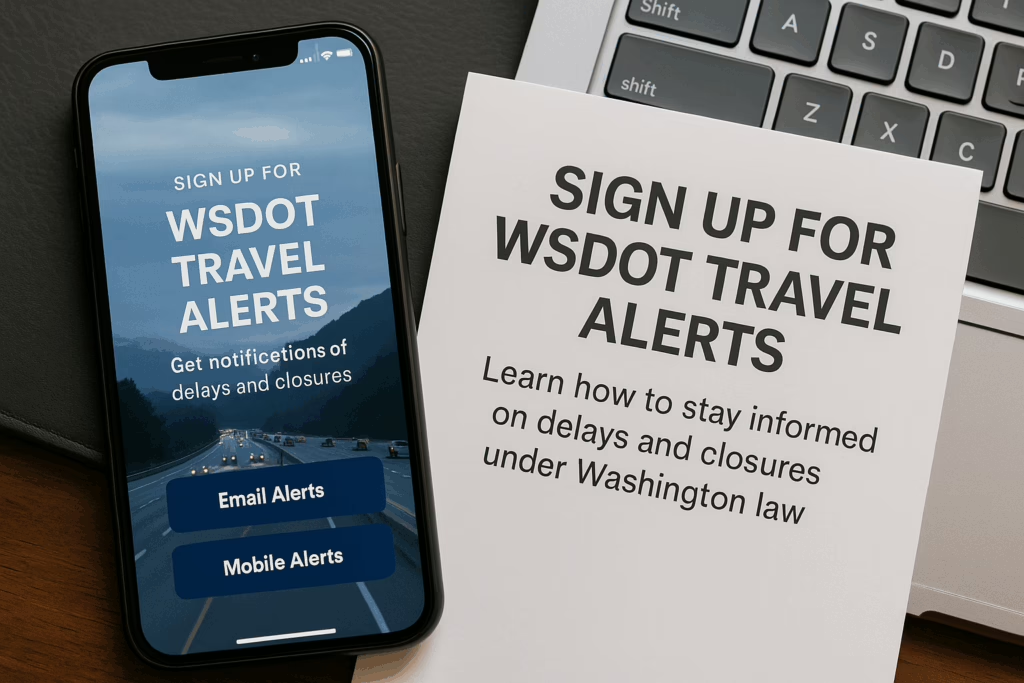Introduction
Washington residents and visitors rely on timely traffic information to stay safe and informed. Under Washington law, WSDOT isn’t just a provider of transportation services—it offers formal notification tools like the WSDOT travel alertssystem, designed to help travelers stay ahead of delays, closures, and emergencies.
What Are WSDOT Travel Alerts?
WSDOT travel alerts are official notifications issued by the Washington State Department of Transportation. They include updates on:
- Road closures or incidents lasting two hours or more
- Severe weather or mountain pass issues like Snoqualmie Pass
- Ferry delays or schedule changes
- Major construction or emergency responsesWSDOT+4Pinterest+4WSDOT+4APKPure.com+10WSDOT+10WSDOT+10
How Washington Law Supports Travel Alert Services
Legal Basis Under State & Administrative Rules
State transportation statutes support WSDOT’s duty to inform the public. WSDOT uses technologies such as traffic management centers, mobile apps, and variable message signs—mandated under administrative rules—to disseminate travel alerts in real time WSDOTWSDOT.
Traveler Rights and Responsibilities
Under Washington law, travelers have the right to receive timely travel information. They are responsible for enrolling in alerts and following official warnings—such as mountain pass chain requirements or ferry advisories—to avoid legal risks including infractions or damage claims.
How to Sign Up for Alerts
Email Alerts
Subscribe via GovDelivery to receive real‑time info on closures, weather, ferry service, and construction. You can manage or unsubscribe at any time by logging into your subscriber profile WSDOT+5WSDOT+5WSDOT+5.
Mobile App Push Notifications
Install the official WSDOT mobile app from the App Store or Google Play. Use the notification bell or menu toggles to customize updates. You can disable push alerts at any time via app settings WSDOT+7WSDOT+7WSDOT+7.
Text Alerts for Snoqualmie Pass & Ferries
- For Snoqualmie Pass (I‑90): Text START to 85107 to receive alerts on significant delays, road closures, and severe weather. Reply STOP to unsubscribe WSDOT+7WSDOT+7WSDOT+7.
- For Ferries: Enter your phone number and select your frequently used route (or all of them) through the WSDOT ferries alert signup. Text alerts will notify you of ferry-specific schedule changes or delays. Reply STOP to cancelWSDOT+4WSDOT+4WSDOT+4.
Legal Considerations & Best Practices for Travelers
Reasonable Compliance and Liability
- Documenting enrollment in WSDOT travel alerts can support claims of due diligence in case of delays or accidents.
- Washington tort law may consider traveler reliance on these alerts when evaluating contributory fault or negligence.
Usage of Information on Roads
- Travelers should monitor electronic variable message signs and follow ATDM (Active Traffic Demand Management) messages—required under WSDOT’s safety protocols—to comply with legal standards for safe driving WSDOT+1WSDOT+1WSDOT+1WSDOT+1.
Call to Action
Contact Blanford Law today at ken@blanfordlaw.com or 253‑720‑9304 for guidance on your legal matter regarding transportation claims, compliance, or travel-related liability.
Additional Resources
- Stay of Forfeiture Judgment in Washington – Learn when and how a forfeiture judgment can be delayed under Washington criminal procedure.
https://blanfordlaw.com/stay-of-forfeiture-judgment-washington/ - Driving in Rain in Washington – A guide to legal precautions and driver responsibilities during heavy rain in Washington State.
https://blanfordlaw.com/driving-in-rain-washington/ - RCW 10.19.110 – Washington Bail Law – Understand your rights and obligations under Washington’s bail forfeiture law.
https://blanfordlaw.com/rcw-10-19-110-washington/ - Roslyn Noise Ordinance – Legal overview of Roslyn’s local sound control rules and potential infractions.
https://blanfordlaw.com/roslyn-noise-ordinance/ - Roslyn Disorderly Conduct Law – Explore how disorderly conduct is defined and prosecuted in Roslyn, WA.
https://blanfordlaw.com/roslyn-disorderly-conduct-law/

